


(After a quack doctor subjected him to painful, futile treatments for his foot, London specialists prescribed a corrective boot, later fitted with a brace, which the patient often refused to wear.) He also formed the first of those passionate attachments with other, chiefly younger, boys that he would enjoy throughout his life before reaching his teen years he had been sexually initiated by his maid. He enjoyed the role of landed nobleman, proud of his coat of arms with its mermaid and chestnut horses surmounting the motto "Crede Byron" ("Trust Byron").Īn "ebullition of passion" for his cousin Margaret Parker in 1800 inspired his "first dash into poetry." When she died two years later, he composed "On the Death of a Young Lady" throughout his life poetic expression would serve him as a catharsis of strong emotion.Īt Harrow (1801-1805), he excelled in oratory, wrote verse, and played sports, even cricket. With the death in 1798 of his great-uncle, the "Wicked" fifth Lord Byron, George became the sixth Baron Byron of Rochdale, heir to Newstead Abbey, the family seat in Nottinghamshire. Early schooling instilled a devotion to reading and especially a "grand passion" for history that informed much of his later writing.

From his Presbyterian nurse Byron developed a lifelong love for the Bible and an abiding fascination with the Calvinist doctrines of innate evil and predestined salvation. She was as likely to mock his lameness as to consult doctors about its correction. (His half sister had earlier been sent to her maternal grandmother.) Emotionally unstable, Catherine Byron raised her son in an atmosphere variously colored by her excessive tenderness, fierce temper, insensitivity, and pride. In the summer of 1789 Byron moved with his mother to Aberdeen. The profligate captain squandered his wife's inheritance, was absent for the birth of his only son, and eventually decamped for France, an exile from English creditors, where he died in 1791 at thirty-six, the mortal age for both the poet and his daughter Ada. George Gordon Noel Byron was born, with a clubbed right foot, in London on 22 January 1788, the son of Catherine Gordon of Gight, an impoverished Scots heiress, and Captain John ("Mad Jack") Byron, a fortune-hunting widower with a daughter, Augusta. In his dynamism, sexuality, self-revelation, and demands for freedom for oppressed people everywhere, Byron captivated the Western mind and heart as few writers have, stamping upon nineteenth-century letters, arts, politics, even clothing styles, his image and name as the embodiment of Romanticism. His faceted personality found expression in satire, verse narrative, ode, lyric, speculative drama, historical tragedy, confessional poetry, dramatic monologue, seriocomic epic, and voluminous correspondence, written in Spenserian stanzas, heroic couplets, blank verse, terza rima, ottava rima, and vigorous prose. He is also a Romantic paradox: a leader of the era's poetic revolution, he named Alexander Pope as his master a worshiper of the ideal, he never lost touch with reality a deist and freethinker, he retained from his youth a Calvinist sense of original sin a peer of the realm, he championed liberty in his works and deeds, giving money, time, energy, and finally his life to the Greek war of independence. He created an immensely popular Romantic hero-defiant, melancholy, haunted by secret guilt-for which, to many, he seemed the model. The most flamboyant and notorious of the major Romantics, George Gordon, Lord Byron, was likewise the most fashionable poet of the day.


 0 kommentar(er)
0 kommentar(er)
